
Your love for the Internet just might be killing your privacy, destroying your business, and ruining your life.
But the reason isn’t quite what you’d imagine; your double-digit hours logged on social media this week isn’t the problem. Neither are your down-to-the-minute Facebook status posts with absolutely nothing interesting to say.
No, no, no. It’s far worse than that.
Internet censorship in America is becoming a problem that is no longer “coming.” It’s here now.
In recent years, bounteous individuals and organizations have vocalized or published their concerns defending free use of the Internet, without treacherous tyrants reigning control over our digital livelihoods.
Unfortunately, many heads have forgotten the very hands that feed them, and in this new age some companies are no longer just in business—they’re now in the business of playing police.
And Verizon is the “company-to-blame” nominee.
Let’s explore the 6 inconvenient truths that Verizon no longer cares whether you know or not because they’ll do it anyway, regardless of the fact you’re giving them your hard-earned.
They’re Blocking Emails to Friends, Family & Customers
Here’s some great news! Verizon has actually begun censoring any email sent by not just other ISPs’ customers, but their own customers as well!
If an email contains a URL (hyperlink), that email is automatically flagged as “SPAM” and is immediately rejected.
- Even if the email is contains important research or critical information—Deleted.
- Even if the email contains a transaction receipt being sent to your customer—Gone.
- What if it’s an email that you replied to, which hence contains a URL? Vanished.
I personally fell victim to their inadvertent internet censorship, when I happily pushed the send button from my email client, to a Verizon.net customer. Right as I believed my email would be promptly delivered to my client, I was slapped in the face with the following email:
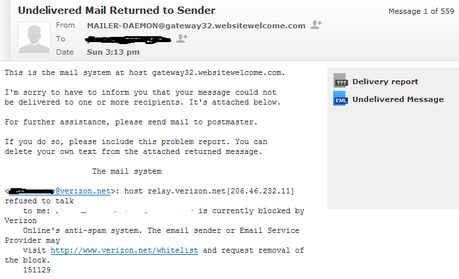
I had my email rejected as being ‘blocked,’ when I’ve never had an email rejected by any ISP since I first began using the Internet, back in 1998. So to receive a rejection from Mr. Mailer Daemon saying the server has rejected the email—due to being on Verizon’s anti-spam list? Nonsensical.
It appears they really are positioning themselves as editors-in-chief of our Internet experience, even at the expense of our businesses, relationships, and even reputations.
For further clarification, directly from the “horse’s mouth,” check this out:
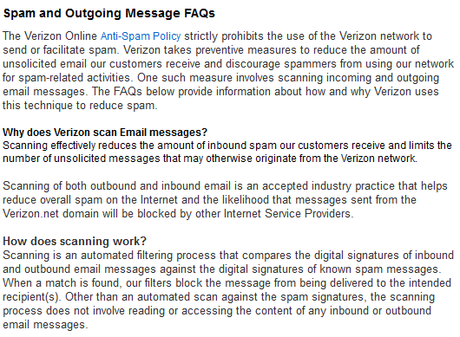
—
They Want to Control What You See & Read Online
And they think they have that right.
Back in 2012, Verizon briefed the United Stated Court of Appeals for the D.C. Circuit, in an attempt to reverse the FCC’s Open Internet Order. In the legal brief, Verizon argued that the First Amendment to the Constitution allows them to legally serve as ‘editor-in-chief’ to the Internet.
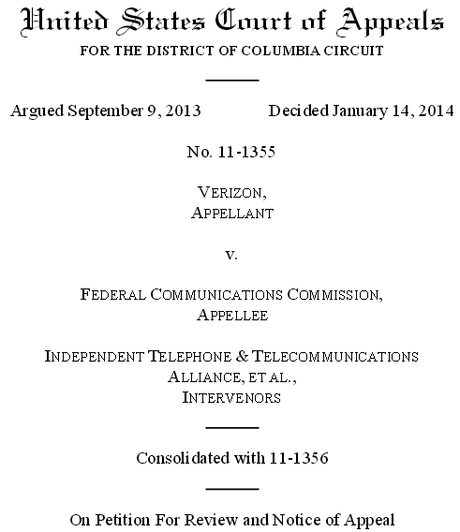
—
But it gets a bit worse than that.
Verizon’s attorneys boldly asserted that “broadband providers possess editorial discretion.” The company-gone-mad is claiming the right to editorial discretion, including when they’re “transmitting the speech of others.”
Their attempt to overturn an open Internet was successful. And the fallout is being witnessed by numerous people, including myself. First reports of the email censorship were reported by 95.1 FM in New York City.
—
They Block Text Messages to Your Family, Friends & Customers
This takes Verizon wireless issues to new heights. In 2007, the company argued they had the right to block “controversial or unsavory” text messages.
An abortion rights group, Naral Pro-Choice America, had their request to Verizon rejected, which asked for the mobile network to be available for a text messaging campaign.
A significant number of businesses use SMS messaging to provide offers, discounts, news, and to communicate in a myriad of ways with their loyal customer base—among other nifty uses for text messaging.
The vast majority of these texts aren’t spam; the customer opted-in to receive the texts that are transmitted from time to time, making it a compliant and legal “transaction.” So if your emails to customers, friends, co-workers or family members are mysteriously disappearing into the ether, question your wireless provider—even if it’s not VW.
—
They Block Your Apps & Those of Your Customers
The FCC’s enforcement bureau fined Verizon Wireless $1.25 million, to settle the investigation which stemmed from the company’s blocking of customers’ email.
The investigation was launched by the Bureau after the company requested a popular app store operator to block their customers’ access to tethering devices—and the block was a success (quite unfortunate for us).
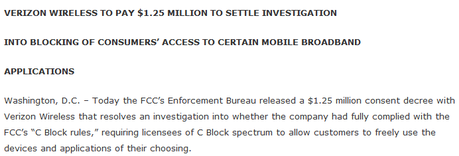
—
By blocking their customers from obtaining tethering apps, the company was forcing (extorting?) consumers on their network to buy expensive “hotspots” and/or other data packages.
There are close to 2 billion mobile device users in the world as of 2015 (last year).
The staggering number of people downloading and using apps on a daily basis require reliable broadband providers; companies that provide the infrastructure to communicate, and the stay-out-of-our-business freedom to enjoy our devices.
And we demand the very respect from these companies that we pay for every month!
—
They Were Capturing Telephone Data, Without a Warrant
A top secret court order was issued 0n April 25th, 2013, from the National Security Agency.
Yes, the NSA.
This hush-hush order demanded the collection of millions of US customers’ telephone records by our favorite broadband provider, VW.
The court order required Verizon to hand over each and every telephone call in its databases, from within the United States and between, as well as other countries. This information was to be requested on an “ongoing, daily basis,” from April 25th, 22013, to July 19th, 2013. Well…supposedly.
—
On a Positive Note!
As of Sunday, November, 29th of 2015, the bulk collection of telephone metadata has (supposedly) ceased. Barrack Obama signed a measure in June of 2015 which stripped away the National Security Agency’s legal authorization to collect bulk data on the phone records of Americans. To the tune of millions, at least.
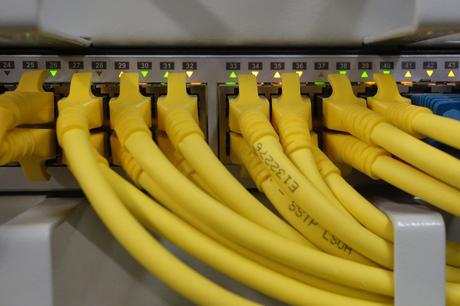
Read: that doesn’t appear to strip away their ability to collect data in other countries, now does it?
Keep these facts in mind, the next time an email dissolves into digital dust, right after you hit Enter, whether you got a rejection email back or not.
Or the next time you get an inbox full of technical support requests, due to an app that just isn’t working at all.
And quite possibly, those emails you sending to several businesses with quotes of your services, or that important project that was due yesterday….never even made it.
Are you using Verizon’s network or even breathing the same air as the company?
Heed these warnings. And your life won’t be ruined….
…as much.
